Namibia’s big discovery
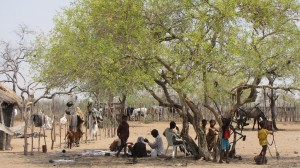
Namibia’s government has made what looks to be a major discovery: a new aquifer that could be the answer to water shortages. One of the researchers on the discovery team is Martin Quinger, a project manager for the German Federal Institute for Geosciences and Natural Resources, told the BBC that the vast water deposit could supply northern Namibia for an incredible 400 years. And that is especially important for a country that is considered the driest in sub-Saharan Africa.
The aquifer, called Ohangwena II, straddles the border between Namibia and Angola, and Quinger says it could be as much as 10,000 years old…but don’t worry, the water is still fresh and safe to drink. As climate change brings around an increasing number of dry spells and drought, the water source is a major discovery.
Rio plus you
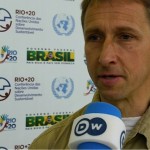
Stefan Rostock, Germanwatch
Author: Kerstin Schnatz
A huge disappointment, a good basis to work from or “a major step forward in achieving a sustainable future” as the United Nations have put it? Depending on who you ask, the outcome of the United Nations Conference on Sustainable Development in Rio de Janeiro in June 2012 is evaluated differently.
In the run-up to the so called Rio+20 Earth Summit, we had asked our Global Ideas crowd to forward their questions to participants of the summit. In Rio, our reporters Philipp and Kerstin asked Stefan Rostock from the non-governmental organisation Germanwatch to answer them. Stefan followed the negotiation process very closely – listen to his answers:
Stefan Rostock Germanwatch by ideasforacoolerworld
About Germanwatch
The non governmental organisation Germanwatch advocates for a more sustainable future in countries of the so-called “South”. It researches and highlights the global consequences that economies and politics of industrialized states have on developing and threshold states – situated mostly in the geographical South of the planet. Germanwatch is based in Bonn and Berlin.
About Rio+20
The United Nations Conference on Sustainable Development took place in June 2012 in Rio de Janeiro, Brazil. With almost 30,000 participants from all around the world including representatives of 191 UN member states as well as 10,000 NGO people and almost 4,000 journalists, it was the biggest conference in the history of the United Nations. Download the 50-page outcome document “The future we want”.
Superhero of bicycles
Author: Kerstin Schnatz
Ever heard of a bike-a-lator? If your answer is “No” we highly recommend you to visit the library of solutions on www.bikestorming.org. Mati Kalwill from Argentina launched the online platform at the Rio+20 summit, the United Nations Conference on Sustainable Development.
“Instead of protesting against people using cars, we celebrate what we stand for. So we take the best of a party and the best of a bike ride to combine it to a bike party.” To support Mati and his team from La Vida en Bici (Life on Bike) one of the hottest clubs in Buenos Aires even put up a VIP bike rack in their entrance hall. Mati loves the fact that “when you come on your bike, you don’t just get into the club more easily, but you also get free and save parking.” Through www.bikestorming.org, he is hoping to share good ideas like these with the world.
Climate Champion
The bike activist’s trip to Brazil was sponsored by the British Council who elected him for their Climate Champion programme. The project supports young people around the globe who tackle global warming.
Climate Champion Mati already accomplished his first mission: The final document of the Earth Summit includes a recommendation to strengthen cycling infrastructure in cities around the world.
How to make UN conferences more bike friendly?
“When I first came to the conference center on my bike, I was surprised there weren’t any bike racks.” Mati admits that even with more bike racks most conference visitors would probably still take a shuttle bus to get to the Summit.
Bike lanes do not exist on the outskirts of Rio where the Earth Summit is taking place making cycling a dangerous sport. “But you need to start somewhere.” Mati smiles knowingly. While he is speaking to us, a new bike rack is set up outside the huge congress center “Riocentro” – thanks to his campaigning.
Mati is dreaming about his next action at the COP 18 Climate talks in oil-rich Qatar this December: “Of course I hope that our goal of 51% of city trips made on bikes rather than cars will be reached before 2030. But if we can make the next big UN conference more bike friendly, this would already be a big step into the right direction.” For his trip to Qatar, he hopes for the support of the British Council’s Climate Champion programme once again.
Mati’s new online platform is a wiki where everyone can post good ideas on how to get more people to ride a bike rather than driving cars: ww.bikestorming.org. If you have a great project for a greener world yourself check out the British Council’s Climate Champion programme.
Minister receives green bracelet
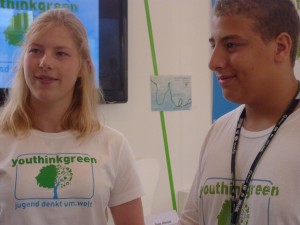
Ahmed together with one of his fellow climate ambassadors from Youthinkgreen.
Author: Kerstin Schnatz
Ahmed’s big eyes are beaming with pride. The young Egyptian is standing on the stage of the German Pavillon in Rio de Janeiro. The 16 year old pupil has started a recycling project at Kairo’s German school which he is presenting to an international audience today at the Rio+20 conference.
“Be the change you want to see in the world“
While politicians are negotiating the final document of the United Nations Conference on Sustainable Development just across the street, Ahmed wants to take action: „In Egypt no one separates their rubbish. Plastic, paper, food waste – everything goes into one bin.”
Triggered by the German initiative Youthinkgreen, the couragious teenager and his classmates set up a plastic recycling scheme at their school. The green initiative is supported by chancelor Angela Merkel and has reached over 200 young people in over ten countries so far. Some of them have come to the Rio+20 summit to present their local projects.
Change does not come easily
“A recycling company to pick up the plastic waste was found very easily.“ Ahmed reflects on his own initiative back home. “But after a few weeks, the garbage man told me that he would stop picking up our bin. It was flooding over with a variety of food scraps, paper and aluminium cans.” To get everyone at school to separate their rubbish correctly, a rota was set up. When asked how he made his classmates do the smelly job, Ahmed laughs: „At the beginning no one wanted to bring down the odd rubbish bin. Now you get a bag of sweets, so my friends sometimes even fight over it.”
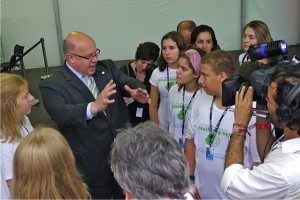
Peter Altmaier and the Youthinkgreen crowd at the Rio+20 summit.
Handshake with a Minister
After the presentation, Ahmed even gets a chance to meet the German Environment Minister Peter Altmaier. Together with his friends from the Youthinkgreen crew, the young man has managed to sneak into Hall 4 – a restricted area and normally reserved for state and United Nations delegates only. But Ahmed keeps his cool and steps up right next to Altmaier: „We have come to bind a green bracelet to your wrist!“ Ahmed and his friends hope that through this little gesture the politician will be reminded of young people’s longing for a greener future.
Altmaier who just turned 54 two days before, laughs heartily and stresses how important it is that young people take action. The Minister takes his time, listens patiently to everything the youngsters tell him. “Please visit Egypt and help us to put up more solar panels.“ Before the journalists can push in to fire their questions at the Minister, Ahmed has grabbed the opportunity to speak up again. Altmaier says that he wishes all the best for Egypt but that he unfortunately can not be in every country at the same time but will remember this meeting. Then he turns around to talk into the television cameras.
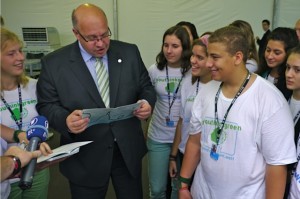
At the Rio+20 congress, teenagers from Youthinkgreen handed over green bracelets and a position paper to politicians and scientists from around the world.
The value of a tree
How do we know whether a country is on the right path of development? Most countries rely on the Gross Domestic Product (GDP) as an indicator. But does this really work? Is GDP the right tool to use? The East Asian country of Bhutan does not think so. Bhutan developed its own indicator to measure the country’s development: Gross National Happiness (GNH) – a concept, Bhutan presented at the Rio+20 summit in Rio de Janeiro. But how does GNH work? That’s what we asked Karma Tshiteem, secretary of the Gross National Happiness Commission of Bhutan.





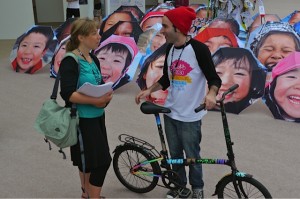
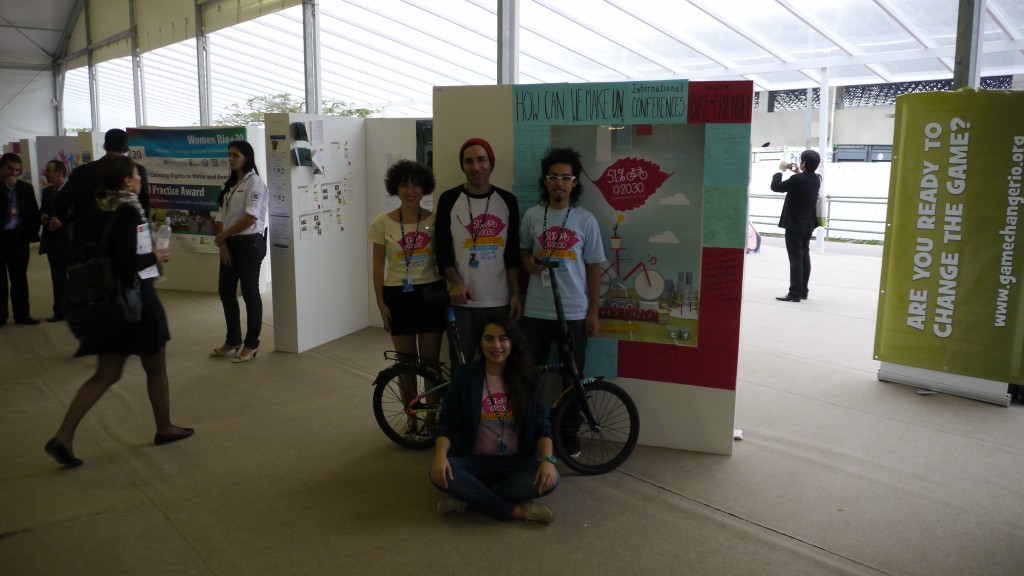

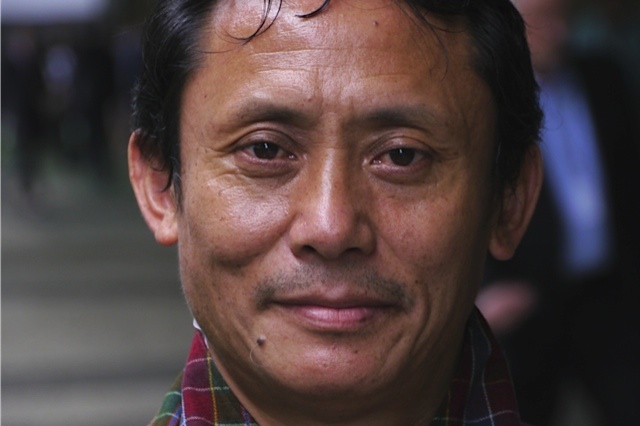




Feedback